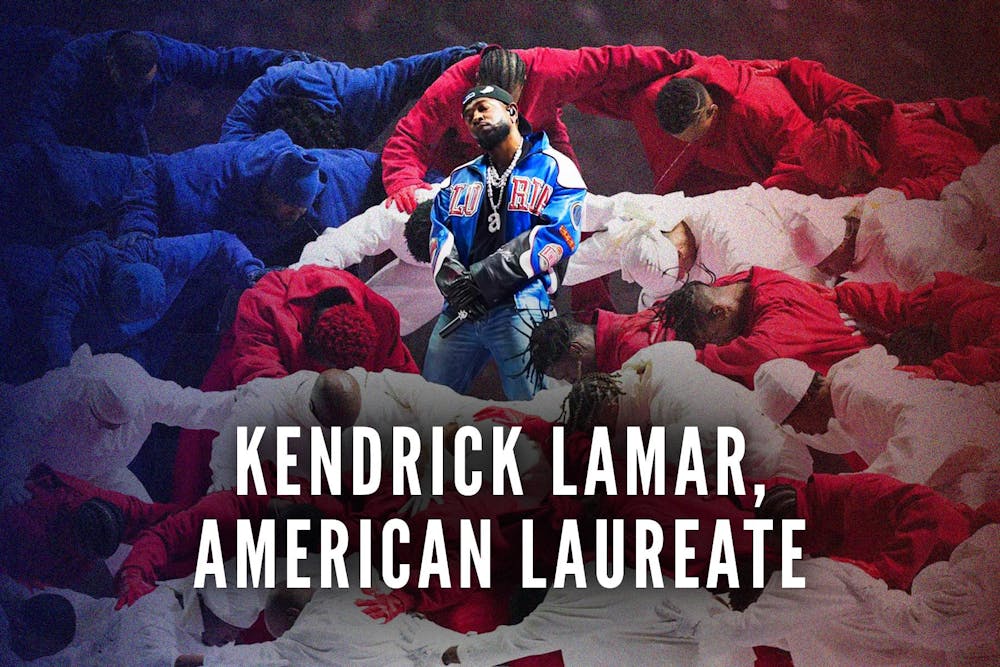Two years ago, I reviewed Rihanna's gravity-defying turn at the Super Bowl 2023 Halftime Show, highlighting the incredible difficulty of such a condensed and precisely choreographed medley of hits that has to appeal to the general American audience, whatever that is. I mention this because Kendrick Lamar opened his performance with not a deep cut, but a literally unreleased verse. His introduction is emblematic of his approach to the halftime show: it is a game for him to play, with rules that exist to be stretched in service of his performance art. It is the boldest Super Bowl performance since Beyoncé brought “Formation“ to the halftime stage, interrupting a supposed reprieve from our fracturing politics with an assertion of, perhaps, a new vision of the American Dream. Kendrick already made rap great again; on Sunday night, his sights were even higher.
“GNX“ is a wonderful album, but not at the level of popularity that past halftime show material reaches. And yet, its selections were perfect for this stage — accessible anthems for Kendrick's vision of an authentic hip-hop rooted in personal heritage, both in terms of musical palette and topical focus and genuine spirituality. “HUMBLE.“ and “DNA.,“ the two solo songs he performed that were not connected to “GNX“ or last year's victory over Drake, grapple with virtue and childhood trauma, extending the vision of rap “GNX“ presents. And of course, Kendrick's two diss tracks toward Drake played at the show, “Euphoria“ and “Not Like Us,“ together slam inauthenticity and abusers. Given the political climate in which Kendrick presents this show — and given that Samuel L. Jackson played an incarnation of Uncle Sam, the political overtones are blatant and unavoidable. It is impossible to imagine who else may be “not like us“ and who that “us“ is on a national scale. And like all great anthems, “Not Like Us“ slips into the bloodstream immediately to eventually force its conversation.
The design elements of the show glitter with inspiration, from the striking flag-colored costumes to the surprising and delightful PlayStation set. The dancers viscerally excite with palpably purposeful movement; there are essays dormant in their formations. SZA's guest vocals are characteristically gorgeous, and her buoyancy somehow plays well with Kendrick's laser focus. The two also have immediate, irresistible chemistry that makes them fantastic duet partners. Kendrick's rapping performance is excellent as ever, leaving more space in the live versions than in their records not only for breath control but also to let his words resonate with the national audience. His poker face smile, first appearing during “Euphoria,“ is another highlight, as he flashes that grin as he begins to annihilate Drake in "Not Like Us," a deservedly viral moment. And finally, Samuel L. Jackson is a scene-stealer as Uncle Sam, embodying the nebulous “general American audience,“ with its deeply felt predilections towards music like Kendrick's with magnetism, while still letting his character's message burrow into the hearts of the audience.
Kendrick Lamar has the gift to be both anthemic and intimate, and the intellectual display here, on par with his records‘ poetic mastery, creates an intimacy to this performance, as the symbolic meaning of it all unfurls within the audience or the smaller communities online discussing the significance of this performance art. Yes, this is performance art at the Super Bowl, a superb display of the power of hip-hop, on par with the writing of any canonized Western author. When Kendrick declares at the start of the performance that “the revolution [is] ‘bout to be televised,“ he is implicitly transferring his vision of hip-hop to the country gathered for the game, a dream for an America where personal heritage is celebrated, and true spirituality can blossom. In 2012, he told the world, “Kendrick have a dream,“ and last Sunday, the world saw, heard and felt it.










